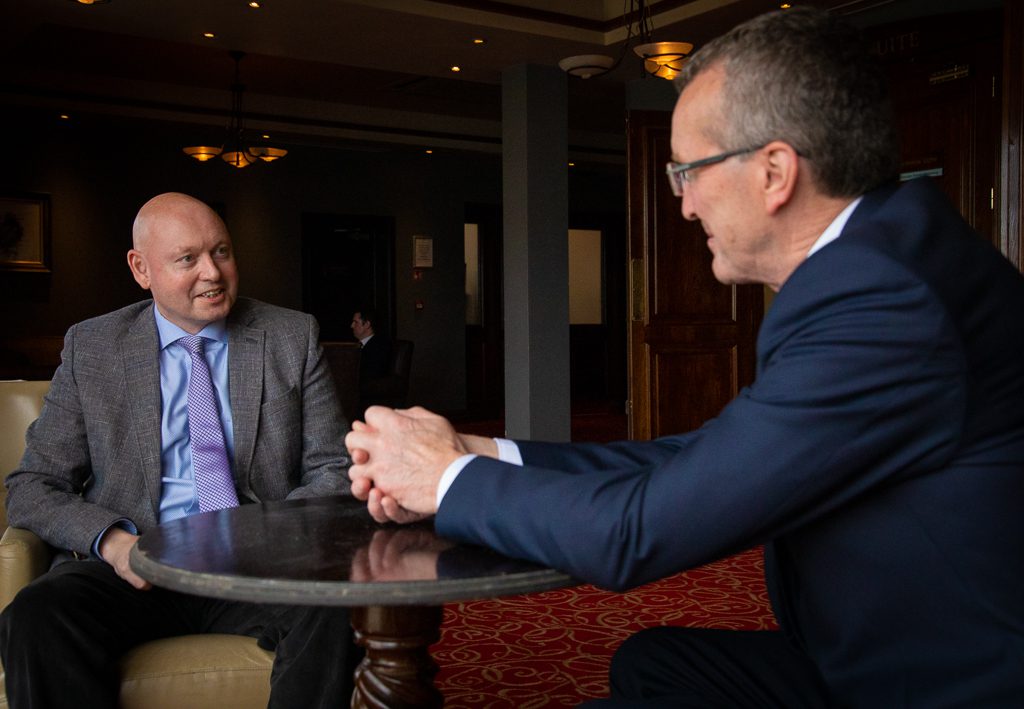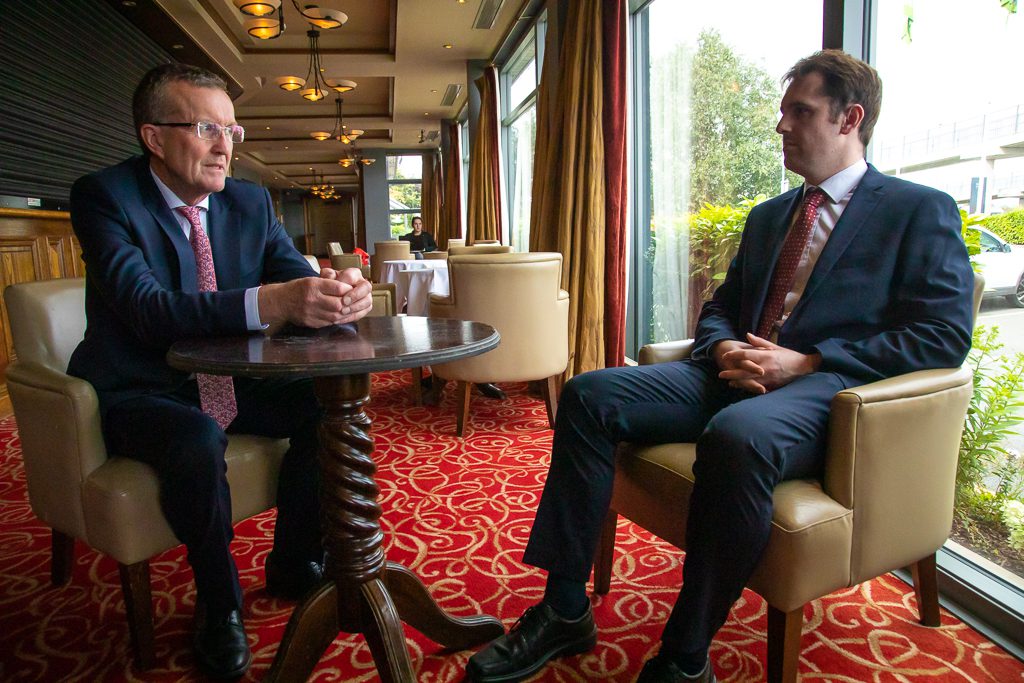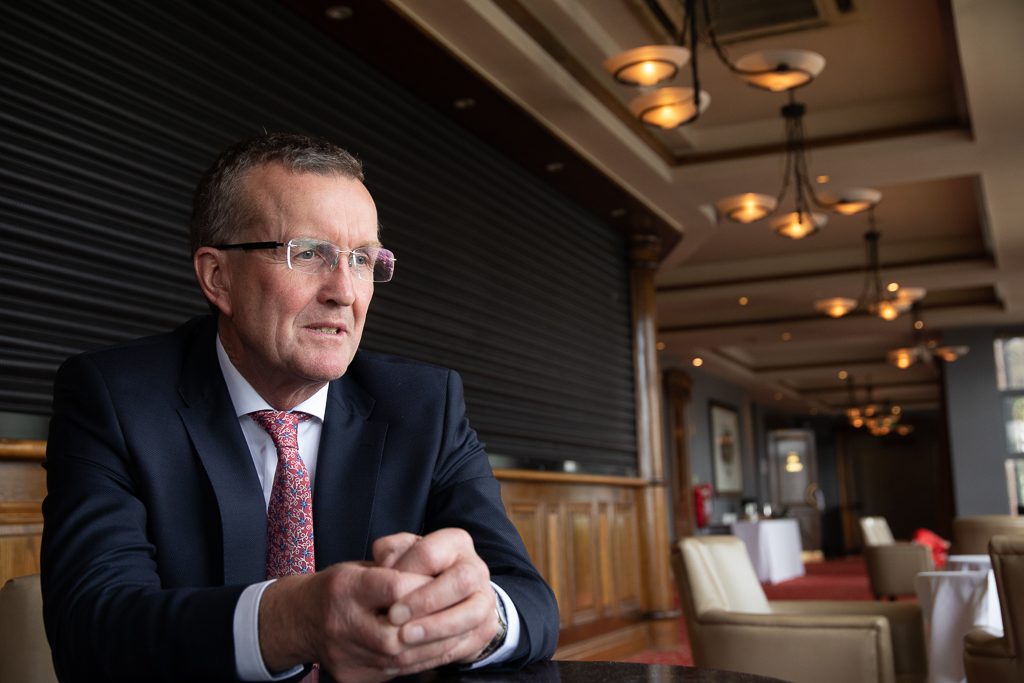Tim Cullinan, president of the Irish Farmers’ Association (IFA), has given a staunch defence of coupled payments under the Common Agriculture Policy (CAP).
In a wide-ranging interview with AgriLand news journalist Charles O’Donnell and editor Jim Breen, Cullinan argued that payments of this type were the “only way” to protect farmers in vulnerable areas in the west of the country.
Also Read: Cullinan interview: Splintering in farm politics – and the IFA’s recent past…The IFA president not only defended coupled payments, but also discussed the wider CAP budget.
The IFA has been pushing for coupled payments. But the ethos in the European Commission and among policy-makers in Europe appears to be to moving away from coupled payments.
Should the IFA be putting its energies into pushing for these payments – payments that ultimately might not have a long-term future in the EU?
Tim Cullinan: I wouldn’t agree with that. We have to look at where farming is in Ireland and there are differentials across the country.
We have had the expansion in the dairy industry, so you have a ‘commercial’ side of farming. But once you go west of the Shannon and down the western seaboard, all the way to west Cork and to the tip of Donegal, if you look at the type of farming that is going on there it’s predominately suckler cows and the sheep on the hills.
We have a duty to protect those farmers in those vulnerable areas. The only way you are going to protect farmers in that area is, obviously, there is going to have to be a coupled payment on the suckler cow…and on sheep.
There is a number of measures [in the EU’s Farm to Fork Strategy] about reducing pesticides, reducing the amount of fertiliser and having 25% of European farmland organic by 2030.
These are massive asks from a European context…and we are part of that. One measure that is in there – that is a positive from what I can see – is that in ‘Farm to Fork’ it is clearly stated that if farmers are sequestering carbon, they need to get compensated for doing that.
We could keep a minimum stocking rate in disadvantaged areas and couple that with a payment for the cow and the ewe…and have a proper environmental payment there as well.
It’s about keeping farmers farming. I was very clear on this in the election campaign. I wanted to protect farmers in those areas. I think the only proper way to do that is – if a farmer is going to farm animals – they should be paid for doing so.
But if we structure future schemes where coupled payments are fundamental parts of them, is there a risk that in a future CAP [after 2027] that there won’t be an appetite in the EU to support coupled payments?
Are we setting ourselves up for a problem down the road, with regard to the long-term viability of farms in the west of Ireland?
Tim Cullinan: This [CAP] programme is a seven-year programme and we have to look at what is happening in Europe at the moment as well.
We have the Green Deal, we have ‘Farm to Fork’ and we have a Commissioner [for Agriculture] who is thinking completely differently. This commissioner [Janusz Wojciechowski] is thinking inwardly…everything being produced local and supplied local. That’s what he is concerned about.
In one of my meetings with him I made it very clear that Ireland is different. We are an island on the periphery of Europe. We can’t talk ‘inward’, because 90% of what we produce is exported.
With the type of farming that is carried out on the western seaboard of Ireland, there is no way we are going to be able to protect them without a coupled payment, along with some kind of environmental payment as well.
When the MFF [Multiannual Financial Framework] and CAP budget were agreed by the European Council, the Minister for Agriculture said that Ireland had gotten €10.73 billion over the lifetime of the programme, which he claimed was a €50 million increase on the current CAP.
However, the IFA initially said that the proposed CAP budget was down in real terms, albeit EU wide.
That message was picked up widely. It led to mixed messages for farmers – trying to make sense of what had actually happened. Is there anything you would do differently on the messaging around the CAP budget?
Tim Cullinan: There are two ways you can look at the CAP budget. You have the ‘constant prices’ and the ‘current prices’. If you look at current prices there is an increase in the budget of €50 million [for Ireland]. When you look back on it, we have achieved more in this budget than the previous two.
If you are to look at constant prices and include a figure for inflation, well then it would be down. That was the message we were getting out there.
We have achieved a €50 million increase but in real terms it is a cut. That’s the point we were trying to make. But the budget is there now and I think our job is to work with the budget as it is. We have the cut of 2.7% in Pillar I, so we have a concern around that.
We have to look at the overall [EU] budget in context. There was an overall budget of €1.8 trillion…and we had the €750 billion recovery fund in that…then we had to get the CAP budget out [too].
The EU has said there is flexibility for member states to transfer funding from Pillar I to Pillar II. Would you push for the minister to exercise that flexibility?
Tim Cullinan: My view is that we need to protect the people who are getting up in the morning and doing the work – they need to get the [Pillar I] payment.
A lot of people in Pillar I have only been taken out of there in the last number of reforms. What I would like to see happening is for the brakes to be put on this.
What we need to do on the other side [Pillar II] is to come up with credible schemes. This is where our government is going to have to step up to the plate.
The EU has now given a commitment that member states can co-fund up to 57%, so that will help to bring people in the vulnerable sectors up and hold onto the payment on the other side [Pillar I], as we need a balance here.
If we keep eroding the [Pillar I] payment we are going to erode those sectors. We can’t allow that to happen.
Stay tuned to AgriLand over the coming days for more from our interview with IFA president Tim Cullinan…




